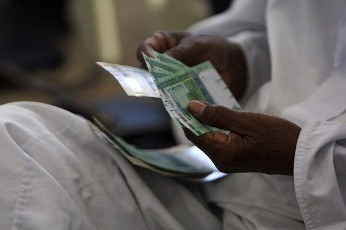Sudanese authorities arrest currency dealers
October 30, 2015 (KHARTOUM) – The Sudanese authorities this week arrested several traders of hard currency in the black market, in a bid to curb the unprecedented rise of the dollar and reduce the negative impact on food prices.

Due to the little official trading in the Sudanese pound the currency black market is considered as an indicator of the health of the national economy. The unofficial currency dealing is banned by the central bank since December 2012.
This week, a dollar bought up to 10.5 pounds, breaching 10 for the first time. The rate on the parallel market was around 9.1 to 9.3 since several months.
The official US Dollar rate stand at SDG 6.0771 for months, but reach 6.9 in the past few days.
But the official rate has little value as the central bank is unable to cover the needs of the Sudanese market through official channels. For the business community the black market is the benchmark.
”The economic department of the National intelligence security services (NISS) has launched a wide-scale arrest campaign against the dealers in the capital Khartoum since five days ago,” said Mukhtar Mohamed, a black market trader in the Khartoum.
”So far they arrested three traders but they found nothing with them. After what they released them few hours later on Wednesday,” he said.
Another trader, Salah Omer has denounced the crackdown, adding that such campaign will not solve the crisis of the lack of hard currency in the country.
”The lack of the hard currency is attributed to the sharp falls in national production and exports not to the currency black market” Omer argued.
Sudanese authorities regularly carry out arrest campaign against currency dealers in the black market following the significant increase of the dollar price four years ago after the secession of South Sudan.
The rate of dollar was 3.3 before July 2011.
Economists further attribute the fall of the Sudanese pound to the high war expenses, corruption and the declining production in the agricultural and livestock sectors.
(ST)

